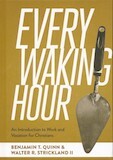Example - Work in Theology at Southeastern Seminary
Video / Produced by TOW ProjectProfessor Benjamin Quinn says seminaries need to train ministers to equip their congregations for work in the marketplace.
Transcript:
My name is Benjamin Quinn. I serve as a professor of theology and history of ideas at Southeastern Seminary and the College at Southeastern.
I was privileged to co-write a book with one of my colleagues, Walter Strickland: Every Waking Hour. There are a couple of gaps that we were trying to close up, or at least attend to in that book. One is the Sunday Monday gap that many people have addressed. The other is what I think of as the pulpit pew gap. If we take Ephesians 4:11-12 seriously, then the reason the people who wear the clerical collars are in ministry is to equip the Saints. This is verse 12: equipping the Saints for the work of the ministry. If that's true, then we need to do a better job of actually attending to the ministry that takes place from Monday through Saturday.
The ministers are not just those who stand behind the pulpits or who are paid by nonprofits and churches. The ministers are all of us who have joined in union with Christ and have been made new in him and are given the ministry of reconciliation.
One area of research that I have is the doctrine of wisdom. I'm frequently digging into Proverbs and bringing that into my theology classes. At the same time, in our church this year in the Sunday School class that I'm a part of we're going through proverbs. So as I'm working on this book, I'm bringing this to bear on what we're doing with the lay people in our church, as well as bringing it into my classroom.
Theology of Work Project has been incredibly helpful to go to the Proverb section. Proverbs 31 for example is such a quintessential passage for the consummate human being. Lady wisdom here is not only a great lady and amazing woman but is also an incredible worker. She thinks very well about her relationship to the world with respect to work and economics and her participation in in the economy broadly speaking.
Any time I enter into this conversation fresh in the classroom you always get those sort of confusing nods. You can see the students almost as if they're saying, “I think you're right. I'm just not sure how you got there. And I've not heard this before. And I'm really curious about that.”
Over time, especially in a theology class when you're teaching the doctrine of creation, you see students at first be curious, then they think you're right, but then over time they come alive on this stuff. You see them come alive to the fact that the material world is still good. It's still God’s. And we're responsible to steward it wisely.






